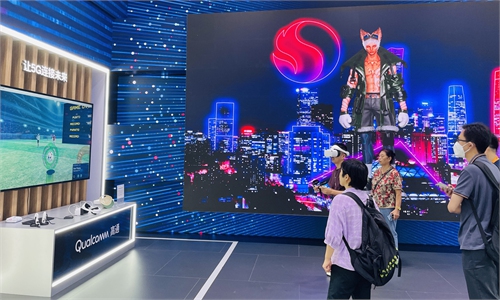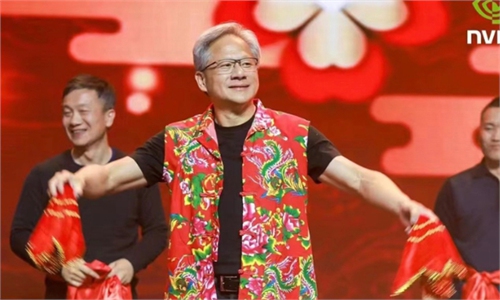
Illustration: Liu Xiangya/GT
Nvidia, a global leader in AI chips, with a market capitalization topping $3 trillion on average over the past two months, is reportedly working on a version of its new flagship AI chips for the Chinese market that will be compatible with the Biden administration's export control dictate, Reuters reported last week.Apparently, the move by Nvidia speaks volume that the US semiconductor heavyweight does not want to lose too much of its market share in China to local competitors, which include Huawei Technologies.
Nvidia will partner with Chinese technology company Inspur on the launch and distribution of the new AI chip, which will be named the "B20," the Reuter report said. Chinese market represented about 9 percent of Nvidia's total revenues in the most recent quarter ending in April, sharply down from 22 percent seen in the same period last year. As a publicly listed company, it is understandable that Nvidia is anxious to snatch back the lost market share in China - the world's largest semiconductor market now.
It is no secret that Huawei is building a massive semiconductor research and development center in Shanghai as the Chinese tech giant continues to ramp up its own supply chain and chip fabrication capability to counter the US government suppression and crackdown.
The Biden administration introduced restrictions on Nvidia to sell its most advanced AI chips, including the A100 and H100, to China in October 2022. It further tightened those controls in late 2023. Washington's export controls have largely reduced Huawei's access to high-end chips and semiconductor fabrication tools. And, the US went too far to coerce its allies Japan and the Netherlands to implement similar restrictions on the export of advanced chip fabrication equipment to China.
However, the US' containment policy has acted as a catalyst in spurring Chinese companies to beef up China's chip self-reliance. The replacement of US semiconductor technology by Chinese firms has ostensibly gained more urgency.
Sales of Huawei Ascend-910B AI chips, whose capability is deemed higher than Nvidia's H20 chips, have increased rapidly in the first half this year as large internet platforms like Tencent, Alibaba, Baidu and ByteDance snapped up the home-made chips to train their respective AI models. Chinese market watchers say that, before long, Huawei's advanced AI, database and other-scenario chips will become the dominant chips in the domestic market. H20 was designed by Nvidia for Chinese market to comply with Washington's export controls.
Dozens of other Chinese semiconductor companies have significantly stepped up investment, striving to localize a greater portion of their own semiconductor supply chain, and improve the country's own semiconductor ecosystem, widely rendered to be increasingly varied and independent from the US ecosystem.
It is Washington's containing-China policy that leads to growing trajectory of the world's disintegrating industrial supply chain. At the practical level, the past era of close and unfettered cooperation between the US and Chinese scientists and technologists has come to an end, caused by the Biden administration's stringent technology controls designed to stymie China's economy.
The fragmentation of the world's industrial supply chains, resulting from the US' de-globalization and "decoupling" policy, is in nobody's interest. The notorious US policy will ultimately throttle America's own industries and slow down its economic growth, while placing its green transition in peril.
Nevertheless, the US' semiconductor technology export controls have, actually, expedited China's indigenous innovation and the development of China's own semiconductor supply chain. The US export controls, if not removed, will inevitably speed up Chinese companies' technology advance, and the US and its allies will get to find their past leverages over China to be diminished and might be totally gone one day as China rapidly develops alternative solutions to replace US technologies.
Increasingly, many in the US say that Biden administration's containment policy is very flawed. In the long run, forcing the US companies to pull out of China's huge market will take a significant toll on US companies' business revenues, depriving them of the capital needed for research and development.
By all accounts, China's market competition is becoming fiercer, which is actually a good thing for businesses, domestic or foreign-invested, to become nimbler and more capable and sophisticated in a setting of free market contest.
It is certainly a laurel for any enterprise if it is able to become an integral part of China-based industrial supply chain, with high efficiency, quality and affordability as the market's clear hallmarks. To put it in perspective, the US government's push to "de-risk" or "decouple" from China is ill-willed and injudicious. In the end, those manufacturing companies following the dictates of the US government by leaving the Chinese market will find themselves weakened and become less competitive.
Any trumpeted effort by the US of a diversification away from China's supply chain is doomed. China has the world's largest number of engineers and well-trained work force, which makes the Chinese market and the country's supply chains theoretically "inescapable" for any enterprise to turn out a viable product and make a good profit.
For sure, China should and will continuously strengthen the resilience and security of its supply chains, such as building up a strategic backup base in the country's vast hinterland for key industries and key resources - including a well-established industry and supply chain with a clearly listed focus on advanced semiconductor chips, industry master machines and advanced new materials.
Lately, Chinese authorities have pledged to remove all restrictions on foreign investment access to China's mammoth and burgeoning manufacturing sector, and to remove more administrative restrictions in its service sector, too. The friendly gesture, plus China's massive and lucrative market, will attract more overseas companies to invest in China, or expand their operations in the country. So, getting tethered to China's highly-efficient supply chain and staying put in the market competition will bring massive benefits to all types of businesses.
The author is an editor with the Global Times. bizopinion@globaltimes.com.cn



